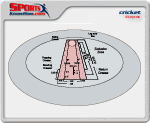Click on the Cricket Pitch layout or the links below the layouts for printable or downloadable Cricket Pitch diagram. Our diagrams show the size, measurements and layout of a Cricket Pitch.
Cricket Pitch
Dimensions Diagram
Cricket Pitch Dimensions:
Overall Dimensions
Cricket is a game where two teams of eleven players compete to score the most runs. The game is played on a grass field with a flat strip of earth in the middle called the pitch. Learning the standard cricket field dimensions is a requirement for anyone wishing to have success in the game. A cricket field is divided into many different sections, each with their own very specific measurements. The field itself, however, does not adhere to any specific shape. Consequently, fixed dimensions are not found for cricket fields, but the diameter is measured anywhere from 450 feet to 500 feet.
Cricket Field Measurements
The ICC Standard Dimensions of a cricket field would require a field containing 16,000 square yards of grass, which is nearly the size of the grass field at the summer Olympics. According to Law 19.1 of ICC Test Match Playing Conditions “The playing area shall be a minimum of 150 yards (137.16 meters) from boundary to boundary square of the pitch, with the shorter of the two square boundaries being a minimum 65 yards (59.43 meters).” The law also states that the straight boundary on both ends of the pitch are supposed to be no less than 70 yards (64.00 meters) in length. The center of the pitch is the starting point for measurements. The measurements are designed so that the playing area is as large as possible while still staying within the guidelines of no boundary being more than 90 yards (82.29 meters) from the center of the pitch.
The Pitch
As stated above, the pitch lies in the middle of the cricket field. The pitch is a rectangular area of the ground 22 yards (20.12 meters) m in length and 10 ft (3.05 m) in width. It is bounded at either end by the bowling creases and on either side by imaginary lines, one each side of the imaginary line joining the centres of the two middle stumps, each parallel to it and 5 ft (1.52 m) from it
Bowling Crease
The creases are areas that are marked white with chalk. There are four creases drawn at the ends of the pitch. The crease that goes underneath the wickets is called the bowling crease. The bowling crease needs to measure 8 ft 8 in (2.64 m) in length. The crease is centered at either end by the stump. The bowling crease will end when it hits a return crease.
Popping Crease
The popping crease, which is the back edge of the crease marking, shall be in front of and parallel to the bowling crease and shall be 4 ft (1.22 m) from it. The popping crease shall be marked to a minimum of 6 ft (1.83 m) on either side of the imaginary line joining the centres of the two middle stumps and shall be considered to be unlimited in length.
Return Creases
The return creases, which are the inside edges of the crease markings, shall be at right angles to the popping crease at a distance of 4 ft 4 in (1.32 m) either side of the imaginary line joining the centres of the two middle stumps. Each return crease shall be marked from the popping crease to a minimum of 8 ft (2.44 m) behind it and shall be considered to be unlimited in length.
Cricket Field Diagram
Cricket rose to popularity in England. It’s recently been gaining popularity among athletes in the United States and other countries. Cricket field dimensions may seem intimidating at first, but most players get the hang of it without any problems and go on to enjoy this relaxing team sport.
